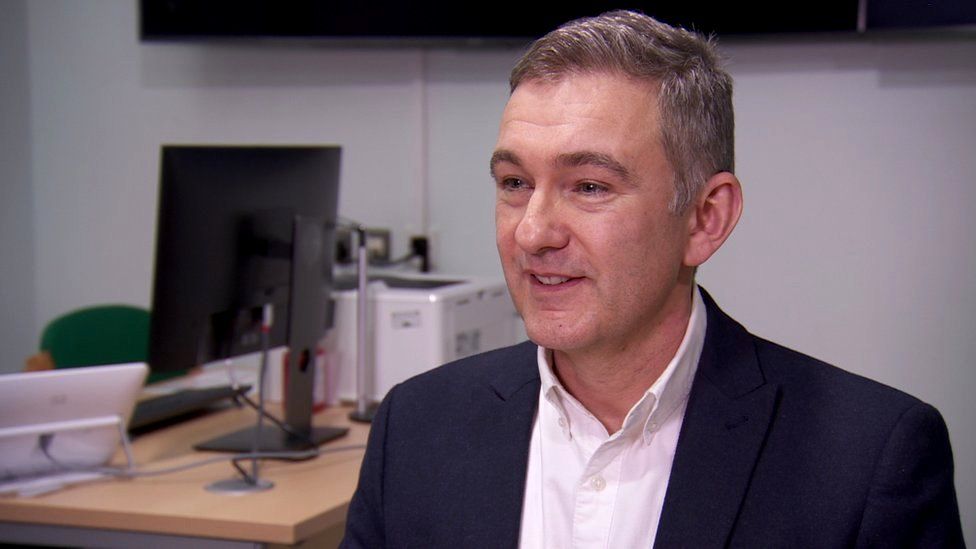
Surgeon Hans Nagar said clinicians and patients should not be satisfied with the current system
By Marie-Louise Connolly
BBC News NI health correspondent
The system for treating gynaecological cancer patients in NI “is close to the brink” according to a leading surgeon.
Hans Nagar, from the Royal College of Obstetrics and Gynaecologists, said investment is needed to improve survival rates.
He added that the physical and psychological impact of waiting on patients should not be underestimated.
Latest figures show 19.8% of patients started treatment within 62 days of being referred – the target is 95%.
Those figures were collated over the 12 months up until March 2023.
Department of Health targets also state that at least 98% of patients diagnosed with cancer should receive their first definitive treatment within 31 days of a decision to treat.
Mr Nagar said clinicians, nurses, or patients should not be “satisfied with the current system” or the statistics around treatment and waiting lists.
The Department of Health said it was “extremely disappointing that the department’s performance targets for cancer waiting times are not being met”.
The department launched a cancer strategy in March 2022, but it said “very significant pressures currently impacting on the delivery all aspects of cancer care in Northern Ireland” was affecting its implementation.
Workforce gaps
The team which spent time visiting all health trusts are usually parachuted into an area when the service is struggling and underperforming.
BBC News NI can reveal that in the Southern Health Trust there was a 41% increase in gynae red flag cancer referrals between 2019 to 2023.
In the Northern Health Trust, during the same period, there was a 25% increase.
Image source, Getty Images
Hans Nagar said more investment could lead to better technology and treatments
Figures from all five health trusts reveal that none of them are compliant with the Northern Ireland cancer strategy waiting time targets.
In a statement, the Southern Health Trust said “theatre capacity remains challenged and unfortunately has not returned to pre-Covid levels as there continues to be ongoing theatre nursing workforce gaps”.
The Belfast Health Trust, which oversees the regional Northern Ireland Cancer Centre, said it acknowledged waiting times for its gynae oncology service are “longer than what we would like”.
It added this was a result of a “high level of referral rate and staffing pressures” that are consistent with those felt across the local health and social care sector.
Not all of the health trusts could provide the data or answer the questions asked by BBC News NI.
However, all said they were dealing with an increase in referrals, reduced staffing and according to the South Eastern Trust “every patient is assessed and urgent cases are prioritised”.
Dr Frances O’Hagan said any wait adds to the frustration and anxiety of patients
Last month, the Northern Ireland Public Services Ombudsman report into waiting lists called “Forgotten” found “significant and repeated failures across the system amounted to systemic maladministration and in many cases had a detrimental impact on the health and well-being of those waiting”.
Dr Frances O’Hagan, an Armagh GP, said figures around gynae cancers including ovarian, cervical and uterine are particularly worrying as these types of cancers are often hidden with patients receiving a late diagnosis.
“Ladies who are affected by gynae cancer, often they have little symptoms until the disease has progressed quite far and then when they do get referred into the system any wait they have to sustain just adds to the frustration and the anxiety these ladies already have,” she added.
Early diagnosis
Hans Nagar said more investment could involve the use of better treatments and technologies such as Parp Inhibitors which are targeted cancer drugs used to treat ovarian cancer.
But he said treatments work best on patients who receive an early diagnosis.
He added he is not “entirely hopeful” about the situation changing soon as there is no plan in place to tackle the problems.
The department said it has received the first draft of the GIRFT report.
A spokesperson said: “Within the constraints of existing budgets the department is committed to taking whatever actions it can to tackle these waiting times and ensure that patients are treated as quickly as possible to ensure best possible outcomes.
“It is hoped that the report will be finalised in September 2023, at which point the focus will shift to implementation of the recommendations.”








